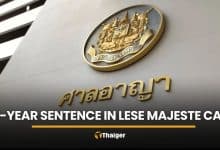OPINION: Thaksin’s plea rang hollow in Phuket

PHUKET: Here in Thailand’s ‘Solid South’, a bastion of support for the Democrat party, Phuket people were unlikely to have been impressed with former premier Thaksin Shinawatra’s emotional plea to His Majesty The King in Bangkok yesterday.
Under the backdrop of the red-shirt rally seeking a royal pardon for him, Thaksin made an emotional plea – like a closing statement for his defense. But does he have a genuine case to begin with? Or even a cause to fight for?
By using sugar-coated remarks, the fugitive former prime minister portrayed himself as an undying royalist. Many see it as an act of hypocrisy. The rally in the capital had been billed as one of reverence, but the way it was organised was clearly an attempt to involve the monarchy in the political struggle.
For better or worse, Thaksin showed his true colours in politicizing the country’s revered institution. The line has now been crossed and time will reveal the consequences.
Less than two months ago, the high drama of Thaksin’s plight began with the launch of a signature campaign to seek a royal pardon.
The petition was drafted to cite political injustice and double standards of law enforcement, both spawned by the 2006 coup, as grounds to seek a royal pardon for Thaksin. Some five million people reportedly signed the petition.
But not many of those came from Phuket. Thaksin supporter Watchara Malikaew told the Gazette that only 10,000 residents of this island province had signed, and that only about 100 Phuket people were likely to have made the trip to Bangkok to witness the delivery of the petition to the Palace.
At the rally preceeding the handover of the petition, the red shirts and Thaksin highlighted their campaign to “redress the people’s suffering”. Not a word about pardon was uttered, although the core message of the petition remained unchanged as a quest for clemency on Thaksin’s behalf.
Thaksin grabbed the opportunity to equate his plight to that of the country’s.
“His Majesty is the King for every Thai citizen and the only one who can redress the people’s suffering,” he said.
He crafted his speech to identify with the poor, showcasing his achievements in meeting the people’s aspirations.
He said his success brought about his downfall because his opponents, often characterized by his supporters as ‘aristocratic’ and/or ‘elitist’, would have lost their vested interests with any advance of democracy.
He claimed his opponents had tried to fault him for being disloyal to the monarchy, although he never wavered in his loyalty to Their Majesties. He also said the coup-triggered judicial review was unfair in convicting him.
But as a self-proclaimed democracy advocate, he should have realised the impropriety of seeking royal intervention in the political and judicial process.
— The Nation / Phuket Gazette
Latest Thailand News
Follow The Thaiger on Google News:


























